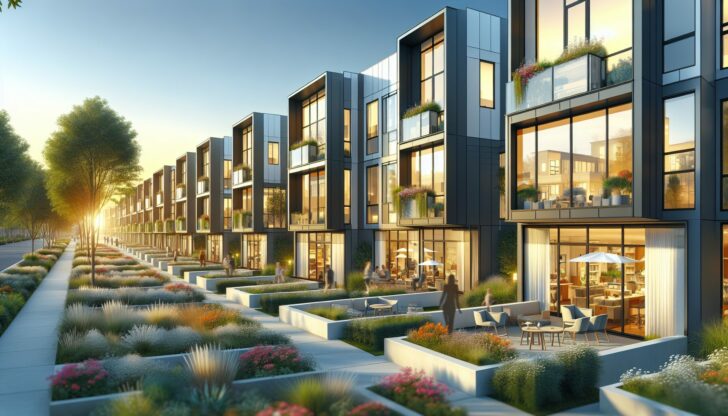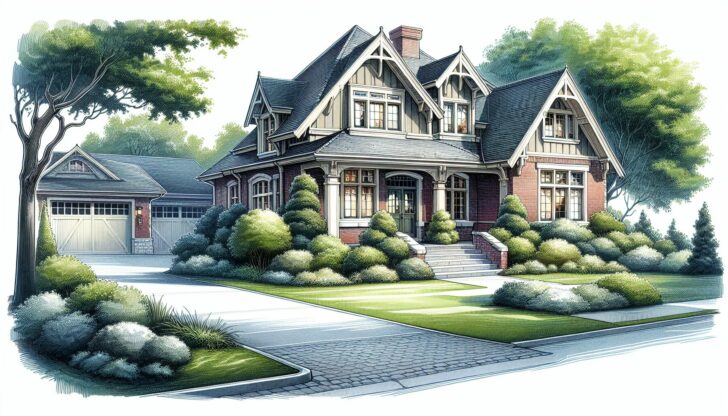Trying to choose between a townhome and a single-family home? In this article, we’ll discuss the topic of “townhome vs home” by breaking down the differences in cost, space, maintenance, and lifestyle to help you decide which is right for you.
Table of Contents
Key Takeaways
Townhomes provide a blend of the benefits of traditional houses and modern condo living, with shared walls and reduced maintenance responsibilities, making them an affordable option for first-time buyers.
Single-family homes offer greater space, privacy, and customization opportunities, typically appealing to families and individuals seeking more autonomy and outdoor space.
Townhomes generally have lower initial costs and maintenance fees compared to single-family homes, but single-family homes tend to have higher resale values and appreciation rates, offering better long-term investment potential.
Understanding Townhomes

Townhomes uniquely blend the benefits of traditional houses with the conveniences of modern condo living. Commonly located in urban areas, these medium-density housing units offer more freedom than condos, albeit less control than single-family homes.
If you’re seeking more space than an apartment offers but wish to avoid the extensive upkeep of a detached home, townhomes are an ideal choice.
Definition of a Townhome
A townhome is:
A multi-floored dwelling with shared exterior walls and roofs
Often terraced or semi-detached
Independently owned, with ownership rights extending to both the interior and exterior, including any yard space.
As they are typically developed in series, the per-unit construction costs for townhomes can be reduced, enhancing their affordability for many homeowners.
Common Features of Townhomes

Townhomes typically have:
Shared walls with neighboring units
Limited outdoor areas, such as small yards or patios
Homeowners Association (HOA) fees, which cover costs associated with trash removal, maintenance, and shared amenities like pools and clubhouses.
Despite their smaller footprint, townhomes often have multiple floors, providing a spacious feel.
Types of Townhome Communities
Townhome communities can vary widely, including traditional townhouses, row houses, and urban developments with shared amenities. Traditional townhouses are commonly found in city environments, forming a townhouse community that shares uniform architecture, creating a harmonious aesthetic.
Row houses line up in neat rows and are known for their uniform architecture.
Understanding Single-Family Homes

Single-family homes, also known as single family dwellings or single family houses, are free-standing residential structures intended for use by one owner as a single-dwelling unit. Compared to townhomes, these homes provide greater space, privacy, and customization opportunities. With no shared walls and direct access to the street, single-family homes provide a level of autonomy that appeals to many homeowners.
Definition of a Single-Family Home
A single-family home is:
A detached structure without shared walls or a shared roof
Featuring dedicated entrances, exits, and utilities
Designed to offer more space and privacy
An attractive option for families and individuals seeking a more secluded living environment.
Common Features of Single-Family Homes
Larger yards and more square footage are typically offered by single-family homes, although they come with higher property taxes. These homes provide more space, which can include larger kitchens, additional bedrooms, and basements for storage. The ability to customize and expand the home is a significant advantage for many homeowners.
Architectural Styles of Single-Family Homes
Common architectural styles of single-family homes include:
Victorian: often feature ornate detailing
Colonial: characterized by their symmetrical facades
Ranch: known for their single-story layout
Bungalow: typically have a cozy, compact design
Split-level: have multiple levels with staggered floor plans
Cost Comparison
In terms of cost, townhomes are generally less expensive than single-family homes. This cost difference extends to lower utility bills and maintenance costs, as townhomes often have shared systems and smaller sizes. However, townhome owners may need to consider ongoing HOA fees, which cover various maintenance and shared amenities.
Purchase Price
Depending on location and size, townhomes offer several advantages:
They are often more affordable than single-family homes.
The average cost to construct a townhouse is significantly lower due to shared walls and utilities.
This affordability makes townhomes an attractive option for many, especially first-time buyers.
Utility Bills and Maintenance Costs
Single-family homes often have higher utility bills due to separate systems for heating, cooling, and electricity. Townhomes, on the other hand, typically benefit from lower utility bills and maintenance costs due to their size and shared systems. This can make townhomes a cost-effective option for many homeowners.
HOA Fees
Townhomes usually come with homeowners’ association fees that cover exterior maintenance, landscaping, and shared amenities. These fees can add up over time, impacting overall affordability. However, these fees also mean that many maintenance tasks are taken care of, reducing individual responsibilities.
Space and Layout
Single-family homes tend to be larger in size and offer more living space, including outdoor areas like backyards and garages. Townhomes, while smaller, provide ample living space with multi-floor layouts and shared walls. Both townhouses and single family homes cater to different lifestyle preferences and needs.
The choice between the two often depends on space requirements and family size.
Square Footage
Offering more square footage, single-family homes can be beneficial for growing families or those who need more room. Townhomes generally have less square footage per floor but may have multiple stories to maximize space.
This makes single-family homes an attractive option for those who need more living and storage space.
Outdoor Space
With typically larger yards than townhomes, single-family homes offer more outdoor space for activities and privacy. Townhomes usually feature smaller yards and limited outdoor space, often located in more densely populated communities. This can be a deciding factor for individuals with children or pets.
Interior Layout
Townhomes often have multi-floor layouts, maximizing living space in a smaller footprint. Single-family homes, on the other hand, offer more varied and expansive interior layouts, providing additional rooms and flexibility for customization.
This flexibility can be important for future renovations or lifestyle changes.
Lifestyle Considerations
The decision between a townhome or a single-family home can be determined by your specific needs, budget, and preferred community. Lifestyle factors such as privacy, noise levels, and community access can greatly influence this decision.
While single-family homes typically offer more privacy and backyard space, townhome communities foster a sense of security and offer shared amenities.
Privacy and Noise
Single-family homes offer more privacy due to the lack of one or more walls shared with neighbors, reducing noise disturbances. Townhomes, with their shared walls, can have more noise-related issues.
This can be a significant consideration for those valuing peace and quiet in their living space.
Community and Amenities
Townhome communities often provide shared amenities like pools, gyms, and clubhouses, fostering a sense of community. These amenities can be convenient for those preferring a low-maintenance lifestyle.
Single-family homes, while offering more privacy, may not have the same level of communal facilities.
Future Needs
Single-family homes generally offer greater potential for customization and expansion, aligning with long-term family and lifestyle goals. This can be important for those planning to start or grow a family.
Townhomes, while popular in rental markets, may have less flexibility for structural changes.
Investment Potential
Generally, single-family homes boast a higher resale value and appreciation rate than townhomes, marking them as a superior long-term investment. However, market conditions and location can significantly impact both property types. Understanding these factors can help you make a more informed investment decision.
Resale Value
For homeowners considering the long-term investment potential of their property, resale value is a crucial factor. Single-family homes tend to have a higher resale value due to their larger lot sizes and greater privacy. However, townhomes can still have strong resale value, particularly in urban areas with high housing demand.
Appreciation Rates
Single-family homes tend to experience higher rates of appreciation in value compared to townhomes. This difference is often influenced by various factors such as location, size, and desirability of the property. This makes them a better long-term investment for many homeowners. However, townhomes can appreciate well in high-demand areas, especially where space for new construction is limited.
Market Conditions
When deciding between investing in a townhome or a single-family home, current market conditions should be taken into account. Demand for townhomes is driven by demographic shifts and economic conditions, particularly among Millennials and Gen Z. These factors can influence the demand and appreciation rates of both property types.
Maintenance and Upkeep
Responsibility for all maintenance tasks, including lawn care, home repairs, and exterior upkeep, falls on single-family homeowners. Townhome owners, on the other hand, may have some exterior maintenance covered by HOA fees.
This can make townhomes a more convenient option for those seeking less maintenance responsibility.
Exterior Maintenance
HOA fees in townhome communities often cover:
Exterior maintenance responsibilities
Landscaping
Painting
Roof repair
To enjoy these benefits, residents are required to pay hoa fees.
Single-family homeowners, however, must manage all aspects of exterior maintenance themselves.
This shared responsibility in townhome communities can result in lower costs for townhouse owners, which is one of the benefits of condo ownership.
Yard Work
Maintaining a single-family home involves various tasks such as lawn care and home repairs, which can require regular attention and effort. Keeping up with these responsibilities is essential for the upkeep and preservation of the property. Townhomes, with their minimal yard areas, reduce the amount of yard work required. This can be a significant advantage for those who prefer less maintenance responsibility.
Home Repairs
Home repairs in single-family homes are typically more frequent, as the homeowner is responsible for all aspects of the home. This often results in higher repair costs, as single-family homeowners must handle all maintenance tasks themselves.
Townhome owners, however, may benefit from shared maintenance responsibilities, reducing the overall burden.
Deciding Factors for First-Time Buyers
When choosing between a townhome and a single-family home, first-time buyers should take into account their lifestyle, budget, and long-term goals. Evaluating current living situations and financial goals can help determine which property type best fits their needs. Factors such as family dynamics, desired location, and future aspirations should all be taken into account.
Budget Considerations
Due to shared structures and common areas, townhomes usually have lower initial costs compared to single-family homes. While single-family homes might come with higher upfront costs, they offer greater autonomy and fewer restrictions compared to townhouses. Budget constraints can significantly influence the decision between a townhome and a single-family home.
Desired Location
Location preferences can significantly influence the choice between a townhome and a single-family home. Townhomes are typically located within:
larger, more densely populated communities
close to public transportation
close to shopping centers
close to entertainment venues.
On the other hand, single-family homes are usually found in suburban or rural areas, offering more outdoor space.
Long-Term Plans
When choosing between a townhome and a single-family home, long-term plans and goals like family expansion or investment potential should be taken into consideration.
Single-family homes offer:
Greater potential for customization and expansion
More space for growing families
More privacy and independence
Potential for higher resale value
These factors may align with long-term family and lifestyle goals.
Townhomes remain popular in rental markets, making them a viable option for young adults facing challenges in homeownership.
Learn more, visit Townhouse vs House: Which is Right for You?
Summary
Choosing between a townhome and a single-family home ultimately depends on your specific needs, budget, and lifestyle preferences. Townhomes offer a blend of benefits from traditional houses and modern condo living, providing more freedom than condos but not total control like single-family homes. They are generally more affordable, with lower utility bills and maintenance costs, and often come with shared amenities maintained by an HOA. However, townhomes may have less privacy and more noise-related issues due to shared walls.
Single-family homes, on the other hand, offer more space, privacy, and customization options. They tend to have higher resale values and appreciation rates, making them a better long-term investment. However, they come with higher upfront costs, property taxes, and maintenance responsibilities. Ultimately, the decision between a townhome and a single-family home should be based on your current lifestyle, long-term goals, and financial situation.
Frequently Asked Questions
What are the main differences between a townhome and a single-family home?
The main differences between a townhome and a single-family home include shared walls and multiple floors in townhomes, while single-family homes offer more space, privacy, and customization options. Consider these factors when choosing between the two options.
Are townhomes more affordable than single-family homes?
Yes, townhomes are generally more affordable than single-family homes due to their smaller size and shared walls, resulting in lower construction and utility costs. However, it’s important to consider HOA fees for exterior maintenance and shared amenities.
How do maintenance responsibilities differ between townhomes and single-family homes?
In townhomes, some exterior maintenance may be covered by HOA fees, while single-family homeowners are responsible for all maintenance tasks, including lawn care, home repairs, and exterior upkeep.
Which property type offers better investment potential?
Single-family homes often offer better investment potential due to their higher resale values and appreciation rates, especially when considering long-term investments. However, townhomes can also appreciate well, particularly in high-demand urban areas.
What lifestyle factors should I consider when choosing between a townhome and a single-family home?
When choosing between a townhome and a single-family home, consider factors such as privacy, noise levels, community access, and future needs. Single-family homes offer more privacy and space, while townhomes provide shared amenities and a sense of community.









